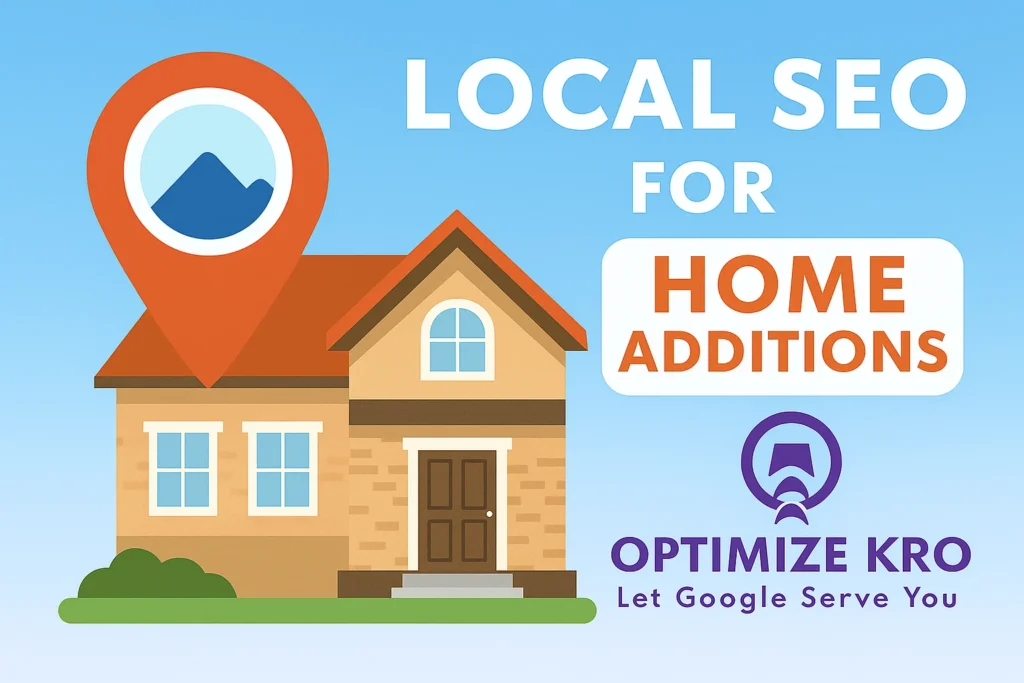Introduction

Homeowners are constantly searching for reliable contractors to expand their living spaces. Whether it’s a new room, a larger kitchen, or a complete remodel, home addition services are in demand. But how do you make sure potential customers find your business before your competitors? The answer is Local SEO.
This guide will walk you through everything you need to know about optimizing your home additions business for local searches, ensuring more calls, leads, and projects.
- Introduction
- What is Local SEO?
- Why Home Addition Companies Need Local SEO
- Understanding Customer Search Behavior
- Google Business Profile Optimization
- John M. – General Contractor
- Sarah L. – Roofing Business
- David K. – Plumbing Services
- Local Keyword Research for Home Additions
- On-Page SEO Strategies
- Content Marketing for Local SEO
- NAP Consistency (Name, Address, Phone Number)
- Building Local Citations
- Online Reviews and Reputation Management
- Local Link Building Strategies
- Mobile SEO for Local Search
- Tracking and Measuring Local SEO Success
- Common Local SEO Mistakes to Avoid
- Conclusion
What is Local SEO?
Local SEO (Search Engine Optimization) is the process of optimizing your online presence so your business shows up when people search for services near them.
Unlike traditional SEO, which focuses on global visibility, Local SEO zooms in on your specific service area—making it ideal for home improvement and home addition contractors.
Why Home Addition Companies Need Local SEO
Think about it: when someone types “home addition contractor near me”, they’re not looking for a company three states away. They want someone nearby who can deliver results fast.
Without Local SEO, your business may never appear in those searches. With it, you can:
- Beat competitors in your area
- Get high-intent leads ready to buy
- Build trust with local homeowners
Understanding Customer Search Behavior
Homeowners usually search for specific solutions, not just general services. For example:
- “Best home addition company in [City]”
- “Kitchen extension contractors near me”
- “Add a second story to my home [City]”
Understanding these patterns helps you create content and service pages tailored to what people are actually searching for.
Read More:
Local SEO for Handyman Services
Local SEO for Real Estate Staging
Local SEO for Appraisal Services
Local SEO for Energy Audits
Google Business Profile Optimization
Your Google Business Profile (GBP) is the heart of Local SEO. It’s often the first thing people see before even visiting your website.
Steps to optimize GBP:
- Claim and verify your profile
- Add correct NAP (Name, Address, Phone Number)
- List all your services (home additions, kitchen extensions, etc.)
- Upload high-quality project photos
- Post weekly updates about ongoing projects
What Our Clients Say
Trusted by contractors and local businesses for proven Local SEO Services.
John M. – General Contractor
“These guys transformed my Google Maps ranking. More calls, more local leads, and better visibility!”
Sarah L. – Roofing Business
“Within 3 months, my business went from page 3 to the top 3 listings. Highly recommend their Local SEO service!”
David K. – Plumbing Services
“Affordable and effective SEO. My local service calls doubled in less than 90 days.”
Local Keyword Research for Home Additions
Keywords are the bridge between what people search for and your website.
Examples:
- “Room addition contractor in [City]”
- “House expansion services [Neighborhood]”
- “Garage to bedroom conversion near me”
Use tools like Google Keyword Planner, SEMrush, or Ubersuggest to identify location-specific keywords with good search volume.
On-Page SEO Strategies
Once you have keywords, place them strategically on your site.
- Title Tags & Meta Descriptions: Include service + location. Example: “Affordable Home Additions in Dallas | XYZ Contractors”
- Location Pages: Create separate pages for each city or neighborhood you serve.
- Schema Markup: Add Local Business schema so Google better understands your services.
Content Marketing for Local SEO
Content isn’t just blogs—it’s proof of your expertise.
Ideas include:
- Before-and-after project showcases
- Cost guides (“How much does a home addition cost in [City]?”)
- Common homeowner questions (“Do I need permits for a room addition?”)
This type of content positions you as a trusted expert in your area.
NAP Consistency (Name, Address, Phone Number)
Google cross-checks your business details across the web. If your NAP is inconsistent, it hurts your ranking.
Ensure your business info matches exactly across your website, Google profile, social media, and directories.
Building Local Citations
Citations are mentions of your business across directories like Yelp, Angie’s List, and Houzz.
The more consistent citations you have, the stronger your local presence becomes. Aim to submit to at least 30+ directories.
Online Reviews and Reputation Management
Reviews are the new word-of-mouth. Google prioritizes businesses with strong, positive reviews.
Tips:
- Ask happy clients to leave reviews
- Respond to all reviews, good or bad
- Showcase testimonials on your website
Local Link Building Strategies
Links are like votes of confidence for your website. For local SEO, focus on:
- Partnering with local suppliers and getting backlinks
- Sponsoring community events or charities
- Writing guest posts for local news or blogs
Mobile SEO for Local Search
Most homeowners search for services from their phones. If your website isn’t mobile-friendly, you’ll lose leads instantly.
Focus on:
- Fast-loading pages
- Click-to-call buttons
- Mobile-responsive design
Tracking and Measuring Local SEO Success
You can’t improve what you don’t measure.
Tools to use:
- Google Analytics (traffic & conversions)
- Google Search Console (search performance)
- BrightLocal (local ranking tracking)
Track metrics like calls, form fills, and GBP impressions.
Common Local SEO Mistakes to Avoid
- Ignoring Google Business Profile
- Stuffing keywords unnaturally
- Not updating NAP across platforms
- Neglecting reviews and reputation
Avoiding these pitfalls keeps your rankings strong and consistent.
Conclusion
Local SEO isn’t just a marketing tactic—it’s the lifeline for home addition companies wanting to grow in a competitive market. By optimizing your Google profile, targeting the right keywords, building citations, and creating valuable content, you’ll be the go-to contractor in your area.
Consistency is the secret sauce. Keep at it, and your phone will keep ringing with new opportunities.
Typically, you can see noticeable improvements within 3–6 months, depending on competition.
Yes. A GBP helps visibility, but your website builds credibility and provides detailed service info.
Consistency—across your GBP, website, and citations—is the key.
Google reviews matter most, but don’t ignore platforms like Yelp, Houzz, or Facebook.
Yes, social signals and engagement can indirectly boost visibility and credibility.

Gulfam Qamar is a seasoned Local SEO expert with a proven track record of helping businesses boost their online visibility and dominate local search results. With deep expertise in Google Business Profiles, on-page optimization, and local citation strategies, Gulfam helps brands connect with nearby customers and grow sustainably. When he’s not optimizing websites, he’s sharing actionable SEO tips and insights to empower small businesses in the digital space.

